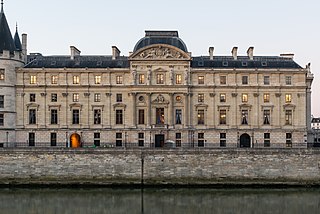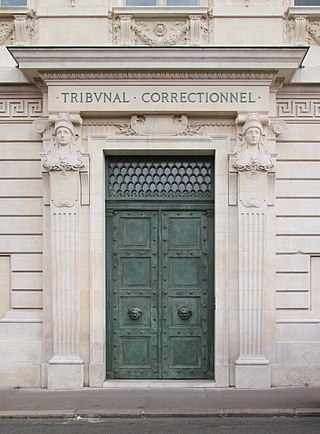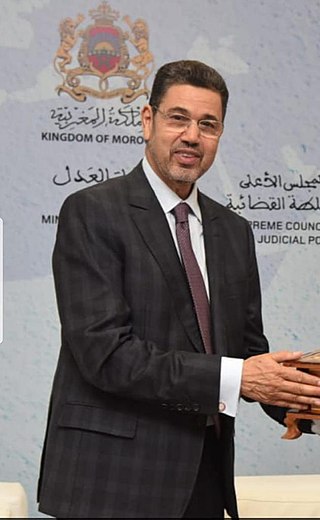
The Court of Cassation is one of the four courts of last resort in France. It has jurisdiction over all civil and criminal matters triable in the judicial system; it is the supreme court of appeal in these cases. It has jurisdiction to review the law, as well as to certify questions of law, to determine miscarriages of justice. The Court is located in the Palace of Justice in the 1st arrondissement of Paris.

A prosecutor is a legal representative of the prosecution in states with either the common law adversarial system or the civil law inquisitorial system. The prosecution is the legal party responsible for presenting the case in a criminal trial against an individual accused of breaking the law. Typically, the prosecutor represents the state or the government in the case brought against the accused person.
In France, a cour d'assises, or Court of Assizes or Assize Court, is a criminal trial court with original and appellate limited jurisdiction to hear cases involving defendants accused of felonies, meaning crimes as defined in French law. It is the only French court consisting in a jury trial.
The Outreau trial was a 2004 criminal trial in northern France on various counts of sexual abuse against children. The trial and the appeal trial revealed that the main witness for the prosecution, convicted for the abuse, had lied about the involvement of other suspects, who were in fact innocent. Several innocent suspects had nevertheless spent years jailed on remand and one died while in prison.

The Court of Cassation of Belgium is the supreme court of the Belgian judiciary. The court is composed of thirty judges with life tenure who are nominated by the High Council of Justice of Belgium and appointed by the Belgian federal government. The court handles cases in the two main languages of Belgium, Dutch and French, and provides certain facilities for cases in German. The court is assisted in its work by a public prosecutor's office and a bar association, which both function separately from other structures. The duty of the public prosecutor's office is to provide advisory opinions to the court on how the law ought to be interpreted and applied. The attorneys of the court's bar association assist litigants in proceedings before the court; in certain cases, their assistance is mandatory.

The courts of appeal are the main appellate courts in the judicial system of Belgium, which hear appeals against judgements of the tribunals of first instance, the enterprise tribunals and the presidents of those tribunals in their judicial area. There are five courts of appeal for each of the five judicial areas, which are the largest geographical subdivisions of Belgium for judicial purposes. The division of the Belgian territory into the five judicial areas is laid down in article 156 of the Belgian Constitution. A judicial area covers multiple judicial arrondissements ("districts"), except for the judicial area of Mons. Each arrondissement has a tribunal of first instance. Further below, an overview is provided of the five courts of appeal and the judicial arrondissements their judicial area covers. It is important to note that the courts of appeal do not hear appeals against judgements of the labour tribunals; these are heard by the courts of labour.

The court of assizes is the trial court which tries the most serious crimes in the judicial system of Belgium. It is the highest Belgian court with criminal jurisdiction; as such, it is the only Belgian court that can sentence someone to life imprisonment. The courts of assizes are not permanent courts; a new court of assizes is assembled for each new trial. There is a court of assizes in each of the ten provinces of Belgium, as well as one in the arrondissement of Brussels-Capital which is not part of any province. Further below, an overview is provided of the eleven courts of assizes and their seats. They are the only courts in Belgium for which the provinces are used as territorial subdivisions. They are also the only courts in Belgium that hold jury trials. The jury acts as sole trier of fact, but decides on the penalty together with the judges. The trial by jury of certain crimes is laid down in article 150 of the Belgian Constitution. The Belgian courts of assizes have the same origin as their French namesakes.
A private prosecution is a criminal proceeding initiated by an individual private citizen or private organisation instead of by a public prosecutor who represents the state. Private prosecutions are allowed in many jurisdictions under common law, but have become less frequent in modern times as most prosecutions are now handled by professional public prosecutors instead of private individuals who retain barristers.
An examining magistrate is a judge in an inquisitorial system of law who carries out pre-trial investigations into allegations of crime and in some cases makes a recommendation for prosecution. Also known as an investigating magistrate, inquisitorial magistrate, or investigating judge, the exact role and standing of examining magistrates varies by jurisdiction. Common duties and powers of the examining magistrate include overseeing ongoing criminal investigations, issuing search warrants, authorizing wiretaps, making decisions on pretrial detention, interrogating the accused person, questioning witnesses, examining evidence, as well as compiling a dossier of evidence in preparation for trial.

The French National School for the Judiciary is a French grande école, founded in 1958 by French President Charles de Gaulle and the father of the current French Constitution, Michel Debré, in order to encourage law students to embrace a judicial career. Originally referred to as the National Centre for Judicial Studies, it was renamed the French National School for the Judiciary in 1972.

In French law, the ministère public or le parquet is the authority charged with defending the interests of society and of the application of law. It is primarily made up of magistrates, but is sometimes represented by other persons such as police officials. Its magistrates can be referred to as "standing" magistrates, as opposed to magistrats du siège. Its closest equivalent in some English-speaking countries is the director of public prosecutions and the attorney general in others.

In France, a cour d’appel of the ordre judiciaire (judiciary) is a juridiction de droit commun du second degré, a. It examines judgements, for example from the correctional tribunal or a tribunal de grande instance. When one of the parties is not satisfied with the verdict, it can appeal. While communications from jurisdictions of first instance are termed "judgements", or judgments, a court of appeal renders an arrêt (verdict), which may either uphold or annul the initial judgment. A verdict of the court of appeal may be further appealed en cassation. If the appeal is admissible at the cour de cassation, that court does not re-judge the facts of the matter a third time, but may investigate and verify whether the rules of law were properly applied by the lower courts.

In France, the tribunal correctionnel is the court of first instance that governs in penal matters over offenses classified as misdemeanors and committed by an adult. In 2013, French correctional tribunals rendered 576,859 judgments on action publique, pronounced 501,171 verdicts and homologué 67,983 compositions pénales.

In France, a procureur général is a prosecutor at a court of appeal, at the Court of Cassation or the Court of Audit. In the case of the appellate courts, the term refers to the magistrate who conducts the prosecution for the court of appeal, as opposed to the judges.

M'hammed Abdenabaoui, born on 21 August 1954 in Khouribga, is a senior Moroccan magistrate and the former attorney general of the King at the Court of Cassation. In 2021, he was appointed by king Mohammed VI as the first President of the Cour of Cassation and deputy President of the Supreme Council of the Judicial Power. He's a noted defender of the independence of the judiciary from the legislative and executive branches.
The federal prosecutor's office of Belgium is a prosecutor's office with jurisdiction over the entire Belgian territory, unlike the other prosecutor's offices which are associated to a particular court or arrondissement. The office was created in 2002 to be able to act more efficiently against certain forms of crime that transcend the borders of individual judicial districts, such as human trafficking or terrorism. In this capacity, the office has the power to carry out prosecutions in all Belgian courts with criminal jurisdiction. The office fulfills its duties under the authority of the Minister of Justice, and is bound by the prosecutorial guidelines of the College of prosecutors-general.
Jean-François Ricard is a French magistrate, and since 25 June 2019 the first prosecutor of the National Terrorism Prosecution Office a parquet for the prosecution of terrorism in France.
A criminal proceeding in French law is one carried out in the name of society against a person accused of a criminal offense by applying the French penal code. It is taken in the name of society, in that its goal is to stop disruption of public order, and not to abate personal damages done to a specific person, which is governed by French civil law.
This glossary of French criminal law is a list of explanations or translations of contemporary and historical concepts of criminal law in France.
In French law, the investigation phase in a criminal proceeding is the procedure during which an investigating judge gathers evidence on the commission of an offense and decides whether to refer the persons charged to the trial court.








